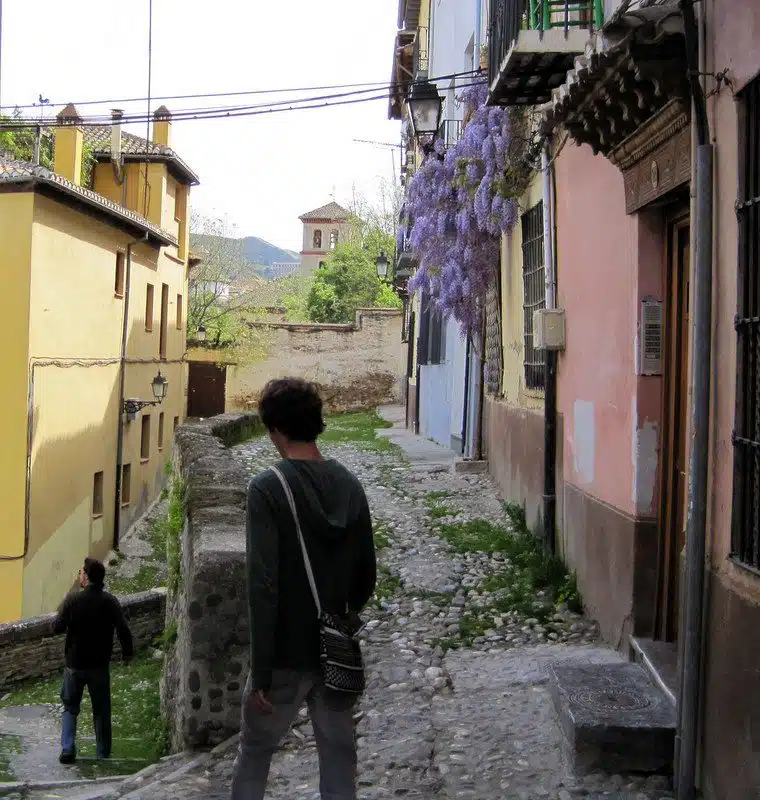Recently, I have gotten a bevy of emails from 16 to 21 year old women asking for advice on their dream of taking a year off to travel. This poses some difficult ethical dilemmas for me that I’d love your help with, dear readers.
Namely: How can our advice to these young prospective travelers balance my worship of travel as education, with my passion for all youth to obtain the educational degrees and work experience they need to succeed in the 21st century job market?

First, here is where I am coming from, personally: I am a 28-year-old who worked full-time as a public high school teacher for six years, saving money through work for this long voyage, and building up slowly for a year away through shorter international trips of one week to three months.
Before flying out of Boston for this nine-month Around the World trip, I had already volunteer taught, taken classes, or traveled through eight Latin American countries and smatterings of Europe during my summers off as an English teacher.

Knowing this, here is my advice-in-progress to 16-21 year olds eager to take a year off to travel.
1. Getting a college degree is ESSENTIAL in this economy, and though you may very well appreciate schooling better after a little time away, once you leave the conventional “river” flow of education, sometimes it is difficult to get back in.
NEVER lose sight of the fact that you need to get your behind back to school ASAP after travel, or you will end up with worse jobs later down the road, and thus smaller earnings with which to embark on future travels!

2. Second only to a college degree in importance is work experience. Make SURE during your time out of school that at least half your time is spent in volunteer (or even paid) positions. Another useful and educational option is to take short-term classes— anything from language (hooray for Spanish immersion!) to Thai massage.
Not only will this help you learn new skills and give your resume a much-needed boost through volunteering or coursework, but being part of a helping or learning organization will make you feel less lonely and more like your travels are worthwhile.

3. Think carefully about whether you want to take an entire YEAR off to travel. Remember that as a college student, you have nearly 3 full months of summer vacation, and for me, that was the perfect amount of time for my first half-dozen voyages.
To be honest, I’m in month eight and a half of travel right now, and it’s really pushing my limits, even as a 28-year-old with extensive travel experience! Consider starting small and working up to a year.

4. A major concern I have about young people without full-time work experience traveling is MONEY– specifically the capacity to have enough self-created savings. Trust me: it is a whole lot more satisfying to travel knowing you earned all your funds your own self, and that’s hard to accomplish for a full year’s voyage unless you have been working full time for several years, which most people under 21 have not.
Moreover, it’s more delicious to experience long-term travel if you’ve been in the working world for a few years and thus know what it’s like to compare.
That said, a lot of this blog is about how travel can be accomplished for less than $1,000 a month (or $30 a day) once you get past the expensive initial plane tickets. This means that it is more than possible for young people save enough through their part time jobs for a few months of travel– which brings us back to point number three: reconsider taking a full year off.

5. While I believe the majority of travel is just as safe as being at home, people embarking on their first long-term travel experiences must ALWAYS keep a good head on their shoulders.
Southeast Asia, for example, is full of literal buckets of alcohol for cheap, and as a result, it is also full of 20-year-old travelers projectile vomiting, falling off treacherous heights, or having pregnancy scares.
There are also always, alas, swindlers, gropers, robbers and worse (and yes, you can click each of those words for articles about each)– though of course the good people of this world far outweigh the bad. Know that you will learn a ton in your travels, but try to learn it the wise way, not the hard way!

6. Now, here are some POSITIVES about traveling as a 16-21 year old! First, this “Gap Year” business is very common in Europe between high school and university, and thus you will be in very good company in areas such as Southeast Asia and Australia to which such Gap Year-ers tend to flow.
Second, the experience, perspectives, and skills gained through travel will give you a much more mature and wise view once you reenter your former life and educational path.
Third, this is an increasingly globalized world, so the knowledge of other cultures you will accrue will be invaluable in your later job searches– and general future interactions with other humans.
So there you have my advice on your dreams, oh 16-21 year-old hopeful travelers!
To summarize: Never forget your education, make sure at least half your travel is volunteering or taking classes, consider starting your travel career with voyages of two to three months instead of a year, try to earn your own funds, be wise to be safe, and know: travel IS awesome and extremely educational, so you’re on the right path!
What else am I missing in this advice, readers? And young prospective travelers, what further questions do you have?
Photo Note: All these pictures were taken in Granada, Spain, which I LOVE, LOVE, LOVE!

The author, Lillie Marshall, is a 6-foot-tall National Board Certified Teacher of English, fitness fan, and mother of two who has been a public school educator since 2003. She launched Around the World “L” Travel and Life Blog in 2009, and over 4.2 million readers have now visited this site. Lillie also runs TeachingTraveling.com and DrawingsOf.com. Subscribe to her monthly newsletter, and follow @WorldLillie on social media!

Sarah
Monday 21st of October 2013
I know this is an 'older' post, but it's still absolutely relevant. I agree totally, especially with getting a degree and work experience. That doesn't mean that you shouldn't travel beforehand though! I would recommend actually doing something though, not 'just' travel. I worked in Switzerland for a year before starting uni. Most of the people I knew at uni decided to change their degree at some point. Not so expensive in Australia, but I imagine it would be in America. Being that little bit more mature when you start can help make a difference.
If you decide to 'travel the world', it is much easier with a degree, especially if you want to make money through teaching English. It just gives you more options in a globalised world.
Sarah P | The Travel Spotlight
Friday 19th of April 2013
I fully second this advice - especially the bit about maximising university vacation as an alternative to a full gap year!
Gap years are wonderful - but I think they're not always necessary. Most students have at least 6 months between the end of high school & university (at least in Asia & UK!). So you can take a "gap year" without actually delaying uni!
Also, universities offer ALOT of opportunities to go abroad - study abroad, summer programs, signing up for competitions (which sponsor your flights) - so it's definitely a practical alternative! As someone who just recently spent my third year abroad (and made it to 14 countries & 70 cities!!) study abroad was a disguised "gap year" for me - without putting my studies on hold!
p.s. I'm new to your blog & it's such a good read! Glad I came across it! Bookmarking it :D
Also, are you in Boston right now? - if so, please stay safe. Thoughts & prayers from Spore.
Lillie
Friday 19th of April 2013
Thanks for your comment and good vibes!
Holly
Friday 19th of April 2013
I agree - I nearly took a gap year before going to uni here in the UK but in the end went straight on with education. Instead, I travelled in my lengthy summer holidays for months at a time - perfect! Or do a course that involves a year studying abroad.
Having said that, I firmly believe age is but a number. If you really want to travel before you do a degree, then do it! Too many young people feel forced into a certain way of life and in reality, opportunities are everywhere, not just a college or uni.
Lillie
Friday 19th of April 2013
Very true.
Connie
Thursday 26th of May 2011
First off, I LOVE Grenada, Spain as well! Your photos bring me back to the days of meandering through the Albacin district and just falling in love with every sensory experience... ANYWAY
FANTASTIC article! And it makes me SO HAPPY to hear that more and more young adults are taking time to explore the world and their place in it before taking the plunge into careers. You've got some great advice here for them and the only thing I can think to add is to KEEP AN OPEN MIND. Traveling is so much about challenging yourself and your limits, exploring alternative avenues and I can't stress how detrimental to learning and growing while abroad than sticking to your guns about things like the type of food you eat or the people you usually hang out with. KEEP AN OPEN MIND and LEARN TO SAY "YES I'M WILLING TO TRY THAT" and the world really does open itself up to you!
Delia
Monday 20th of September 2010
It will probably never be cheaper/easier to go abroad than as part of a college program. You can apply loans and financial aid, and often a lot of the not-fun work (visas, round-trip airfare, where to stay in somewhere expensive like Paris) is done for you (as opposed to the wicked fun work of planning spontaneous side trips). Also, if you do your research and do it right, you will get credit at your school and still graduate on time.
As far as the issue of whether study abroad is really a genuine experience, I think it has the same potential to be fully immersing or a drunken playground as the backpacker trail, a package tour or anything else. It's easy to fall into not socializing or practising the language, so my advice to those going out on study abroad is to practice talking to strangers and being bold, and to do their best to push themselves out of their comfort zone and take as many classes related to their location (language, history, local dance, whatever!) as possible.
Other than that, I totally agree with Lillie--volunteering abroad, travelling in the summer, etc. Also, never forget how amazing and diverse your own country is, especially if you live somewhere like the United States. It can be much less expensive but is a great trial run, especially if your parents are nervous. Finally, pick your college carefully, with travel in mind. I go to Northeastern University, and my major (International Affairs) REQUIRES that I spend at least a semester abroad. Moreover, my university provides resources and opportunities to spend every summer abroad, work abroad, and do multiple semesters.
Good luck, from a fellow 21 year old who isn't waiting to travel! ~delia
Miranda
Sunday 21st of August 2011
I want to second all of this! At University of Missouri, we're allowed to study abroad up to three full semesters (or a combination of fewer semesters + more shorter programs). I'm taking maximum advantage of it by having spent one semester in Spain, one semester in Germany, and, hopefully, one coming semester in Norway! Before heading to Spain I spent a month backpacking the U.K., and after Germany I spent a month travelling through Eastern Europe... and I visited 16 other countries through shorter breaks in our semesters... while still taking interesting local classes and advancing my self confidence and language skills enormously!
Lillie
Monday 20th of September 2010
Beautifully put, Delia. Thanks for the inspiration!